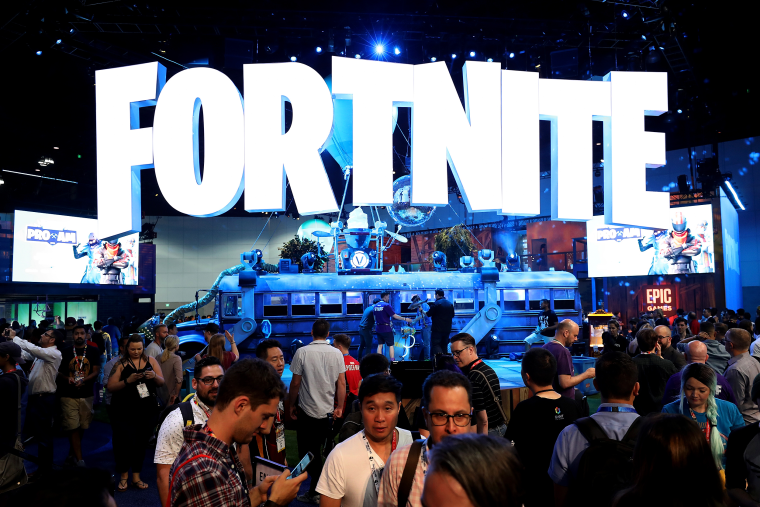Even in a video game industry that has in recent years reached new heights in terms of popularity, cultural impact and profit, "Fortnite" was an outlier in 2018.
The video game has attracted more than 200 million players while also entering mainstream culture in a way few — if any — games have before. NFL athletes who used to celebrate touchdowns with prayers or chest bumps now celebrate with references to "Fortnite." And if that weren’t enough, it’s hard to put a camera on a child under the age of 14 without them breaking out into one of the dances performed by "Fortnite" avatars.
For much of 2018, "Fortnite" was searched for as much as President Donald Trump, according to Google Trends. "Fortnite" also came in at No. 7 on the most Googled "What is ... ?" questions of the year in the U.S.

"Nothing compares. It’s unprecedented," said Joost van Dreunen, chief executive of gaming analytics firm SuperData. "What happened with 'Fortnite' has never happened before."
For the uninitiated, "Fortnite" is a game best known for its "battle royale" mode, where players drop from the sky onto an island with 99 other players. Players scrounge the island for weapons and building materials and attempt to eliminate one another. The last person standing wins.
Many other games, like popular franchises "Call of Duty" and "PlayerUnknown's Battlegrounds," have included a "battle royale" mode. What makes "Fortnite" unique, however, is just how ubiquitous it has become — a strategy that is paying off for its creator, Epic Games. The game is free to play and available on almost any device, a departure from games that are costly or only available on certain platforms — or both.
"'Fortnite' is everywhere because the barrier to entry is so low," said Jeff Gerstmann, editor-in-chief of Giant Bomb, a video game review site. "It’s available everywhere. Almost anyone can play it on a phone and anywhere they can play games. By virtue of it all over the place and free to play and a very popular type of game in terms of battle royalestuff, it's kind of a perfect storm. It really all came together for them in any big way."
That "perfect storm" has meant a windfall for Epic Games. The company has not released revenue numbers, but SuperData estimated the game had brought in more than $2 billion since its initial launch in late 2017 — made entirely through microtransactions.
Users can play "Fortnite" without spending a dime, but the company makes money off the purchase of an array of in-game accessories that customize a player’s appearance in the game. Players can buy new looks for their weapons, clothing for their characters, and popular dance moves so that their avatars can shuffle on the graves of their enemies.
And it’s those dance moves that have become a cultural phenomenon of their own. One of the most popular functions of "Fortnite" is their emotes, where players can press a button and their digital avatars will do a short little dance.
For example, with millions of people watching 2018’s World Cup finals, French soccer player Antoine Griezmann scored a penalty kick, raced to the sidelines and did a jig from "Fortnite."
The dances have become so popular that they’ve led to lawsuits from people who claim to have invented some of the moves, including Alfonso Ribeiro, who popularized "The Carlton" dance on "The Fresh Prince of Bel-Air."
Part of the game's appeal is also its popularity as a spectator sport. Millions of people play the game, but millions more watch the game being played. On the streaming platform Twitch, hundreds of thousands of people tune in to "Fortnite" every minute.
"In 2018, Twitch viewers watched more than one billion hours of people playing "Fortnite," according to SuperData.
Richard Blevins, a Twitch streamer who goes by Ninja, has amassed more than 12 million subscribers with his "Fortnite" content and now makes more than $1 million every month by streaming his gameplay. Ninja broke the record for the most-watched single-person stream on the platform with over 600,000 people tuning in when he, NFL wide receiver Juju Smith-Schuster, and rappers Travis Scott and Drake played "Fortnite."
And that’s in the casual gaming scene. Epic Games, seeking to make a huge splash in the esports realm, announced $100 million in prize money for competitive "Fortnite" tournaments.
Will we still be talking about "Fortnite" next year? Experts aren’t sure, but there are other viral crazes that stuck it out for the long haul. The game’s updates, called "Seasons," have also kept the game from fading.
The newest update of "Fortnite," for example, includes planes that players can enter and attack enemies from the air. Previous updates included cameos from other well-known characters, such as Marvel’s Thanos and Disney’s Wreck-It-Ralph.
"Epic Games has the ability to constantly keep people guessing and updating the game that keep it fresh," Gerstmann said. "They’re rewriting the book on keeping games fresh. It’s exciting to watch."
Even if the game's popularity were to fade in 2019, van Dreunen said "Fortnite" will be remembered.
"The size of the splash it made is bigger than anything we’ve ever seen," said van Dreunen. "That’s how entrenched it is. It’s the ‘Macarena’ of this generation."

